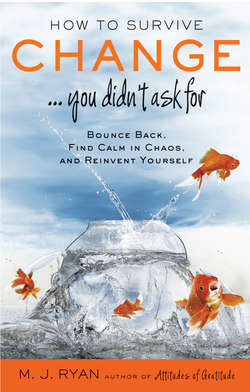Читать книгу How to Survive Change . . . You Didn't Ask for - M. J. Ryan - Страница 16
На сайте Литреса книга снята с продажи.
III The Actions of a Change Master STEP 1
ОглавлениеAccept the Change
We cannot change anything unless we accept it. Condemnation does not liberate, it oppresses.
—Carl Jung
Whenever we're in a situation that's changing, no matter what it is, the most common initial reaction is—you guessed it—denial, followed by anger. Almost immediately many of us respond to unwanted change with a knee-jerk refusal to accept what's happening, or we rail against having to confront it, uttering (verbally or mentally) refrains like:
“It's not my responsibility.”
“I don't have the energy.”
“I don't have the time.”
“I don't want to.”
“This isn't fair.”
“This isn't what I signed up for.”
“I shouldn't have to. It wasn't supposed to be like this.”
Sound familiar? Underneath all those messages is a plaintive cry: I don't know how to adapt and I'm upset that I have to! These thoughts and the emotions underneath are natural, but counterproductive. They trip us up and keep us stuck.
Really, the best first thing we can do rather than stick our heads in the sand is get clear on what is actually happening so we can get down to the business of dealing with it. The acceptance phase is usually the hardest one, since what's happening to us can trigger old wounds and/or require us to go into overdrive in an arena where we'd been happily coasting on autopilot. But it's also the most important one, because if we don't accept the reality of what's happening and deal effectively with our feelings, we simply can't respond in the most productive manner.
That's why this part includes a number of insights to help you gather the facts. You'll learn why, because of how our brains are structured, gathering information is not as simple as it sounds. Then I offer ways to help you avoid spending precious energy on denial, blame, shame, or debilitating fear and give you tools to deal with your difficult feelings. My goal is for you to end this part with a more relaxed, less panicked awareness of the situation and a greater ability to respond to it from a centered and clearminded place. From there, you'll be ready to go into the next phase of brainstorming solutions.
